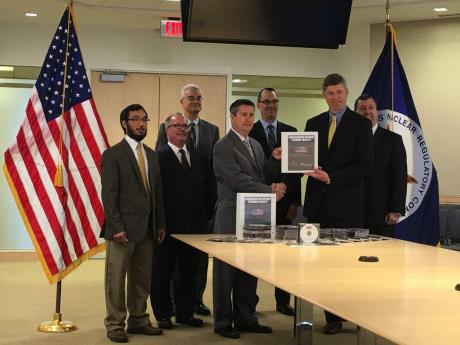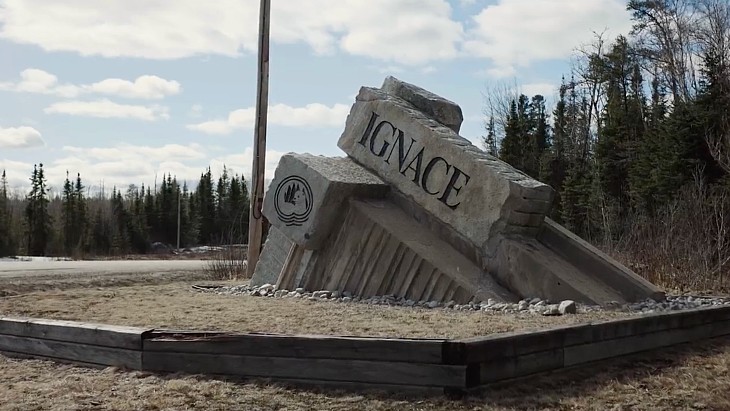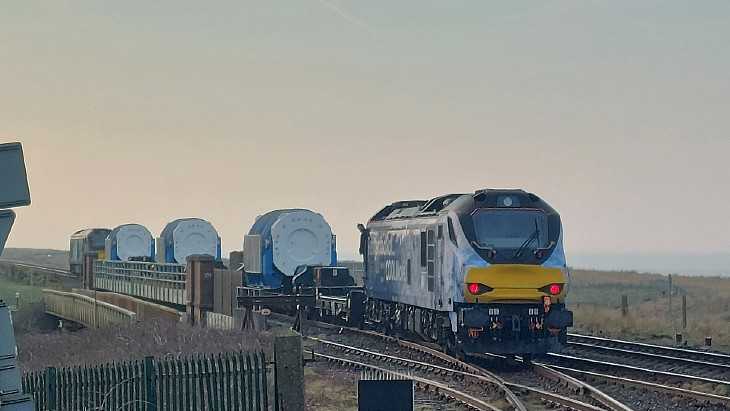Regulatory milestone for US central storage facility
 An application for a licence to construct and operate a Consolidated Interim Storage Facility (CISF) for used nuclear fuel in Texas has been submitted to the US Nuclear Regulatory Commission (NRC).
An application for a licence to construct and operate a Consolidated Interim Storage Facility (CISF) for used nuclear fuel in Texas has been submitted to the US Nuclear Regulatory Commission (NRC).An application for a licence to construct and operate a Consolidated Interim Storage Facility (CISF) for used nuclear fuel in Texas has been submitted to the US Nuclear Regulatory Commission (NRC).
 |
| The application is delivered to the NRC's Joel Munday by Rob Baltzer, CEO of WCS |
Submission of the application by Waste Control Specialists (WCS), with the support of partners Areva and NAC International, has been hailed as a regulatory milestone in efforts to establish a CISF at the company's facility in Andrews, Texas. WCS already operates two separately licensed disposal facilities for low-level radioactive waste at the site, including the Texas Compact Disposal Facility, the only commercial radioactive waste disposal facility in the USA to be licensed within the last 30 years.
WCS said that the application followed a year of pre-application meetings. The company has kept to the timeline it set out when it notified the NRC of its intention in February 2015.
The issue of how to store used nuclear fuel pending the availability of a federal repository for permanent disposal is a pressing one for US nuclear power plants. The CISF would provide engineered interim storage facilities for used fuel that has already been placed in dry storage casks at the nuclear plant site. The storage casks would be encased in an additional NRC-certified transportation cask and transferred primarily by rail to the facility, where it would be removed from the transportation cask and placed in storage. The first fuel to arrive at the facility would be from reactors that have been permanently shut down.
WCS president and CEO Rod Baltzer said that the licence submission places the project on track for completion in 2021. He said that the company is proposing an initial 40-year storage licence for 40,000 tonnes of heavy metal to be built in eight phases, each able to accommodate 5000 tonnes. The proposal includes opportunities for 20-year licence renewals after the initial licence period.
"Thanks to the hard work of our partners at Areva and NAC International, and input from NRC, we were able to deliver a very thorough, detailed licence application," Baltzer said. "As a result, I am confident that we will have a final licence in approximately three years."
NRC will now review the application to ensure that it contains sufficient information to enable it to conduct detailed reviews. Once accepted for review, the regulator will carry out parallel reviews on the safety and security aspects and the environmental impact aspects of the proposed facility. The process will involve the preparation of a safety evaluation report, an environmental impact statement, and a hearing if one is requested by interested parties. The regulatory process is expected to take about three years.
Areva and NAC between them represent 62% of existing dry storage systems in the USA, including 78% of used nuclear fuel stored at sites where there is no longer an operating reactor. Areva signed an agreement with WCS in 2015 to support the licence application and environmental report for the facility. Areva and NAC also signed a separate agreement to work together to support the licensing, design, construction and operation of the CISF, to ensure that the facility can handle the majority of commercial used nuclear fuel and reactor-related used fuel and high-level waste already in dry storage at US sites while also leveraging their expertise in used nuclear fuel transportation.
The NRC expects to receive an application for a second centralized interim storage facility, from Holtec International, for a site in New Mexico, by the end of November.
Researched and written
by World Nuclear News
_17992.jpg)
_75800.jpg)








_50521.jpg)

